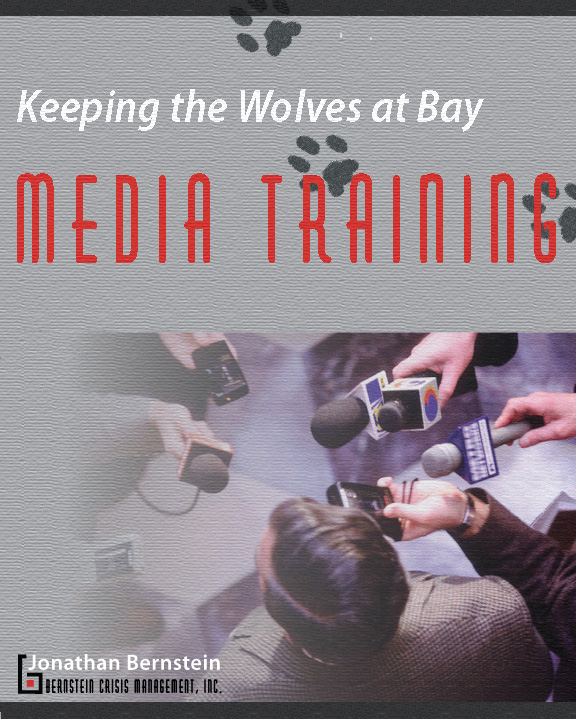|
|

|
CRISIS MANAGER
The Internet Newsletter about Crisis Management
Editor: Jonathan Bernstein
"For Those Who Are Crisis Managers,
Whether They Want to be or Not"
ISSN:1528-3836
� 2010 Jonathan Bernstein
|
Volume XI, Number 05
| March 17, 2010
|
|
JUST A THOUGHT
Failure to address the causes and conditions of
crises guarantee they'll happen again.
|
|
|
FROM THE EDITOR
As my readers know, I'm a strong proponent of using plain English to communicate important concepts, and hence was delighted to meet up, virtually, with author Jean Palmer Heck. Her Tough Talks in Tough Times provided fodder for the feature interview in this issue.
That lengthy interview is followed by a few short topics, the mentionable debris from my "newsletter ideas" folder.
Thank you to all of the initial purchasers of my new
Keeping the Wolves at Bay - Media Training. The content and design have been getting rave reviews, much appreciated by me and my designer/illustrator/wife, Celeste.
If you are eager for crisis management-related news in between issues, do visit our blog, which is fed stories five times a week by our "blog team," my son Erik and I. Erik is also making some of my clients very happy with his social media program implementation on their behalf.
As always, if you like what you see, please share it with others and tell them to subscribe!

My best to all, Jonathan
|
TOUGH TALKS IN TOUGH TIMES
An Interview with Author Jean Palmer Heck
By Jonathan Bernstein
[Editor's Note: I
actually can't remember where I first saw material written by Jean Palmer Heck,
but I do remember thinking "Hey, that's someone who understands the connection
between employee relations and crisis management." Too often, an employer's focus is all on external audiences. When I got my hands on her book, Tough Talks
in Tough Times, I knew that I had to interview her for this ezine. As you'll see
below, Jean is a plain talker -- and her advice is solid gold.]
JB: I maintain that every
employee is a public relations representative and crisis manager for their
organization, whether we want them to be or not. Do you agree?
JPH: Of course, I agree! Each person on the
payroll is the face and voice of your company. Treat them fairly. Educate them
about issues that affect the business (macro and micro; local, national and
international). Show them that you value them by listening to their
perspectives. They are the ones who will help you and your company weather the
current economic storm and any crisis that comes your way.
JB: I've seen employers walking on
eggshells around their workers when it comes time to announce bad news.
Is that the right approach?
JPH: It's quite natural, but it isn't
the right approach. In my research for Tough Talks in Tough Times: What Bosses Need
to Know to Deliver Bad News, Motivate Employees & Stay Sane, I
interviewed many business owners, HR experts and psychotherapists, among
others. I heard many personal stories of
how the bosses began to distance themselves from the workforce when they were
aware bad news was looming. These same bosses felt a closeness with their
employees before hand and thus were personally disturbed by actions they would
need to take. It added to their stress in the long run.
As the therapists and counselors noted,
when the boss distances himself or herself from employees, it does nothing to
help anyone. It's a compassionate
connection which will help the employee absorb bad news.
JB: I have often said that
"in the absence of communication, rumor and innuendo fill the gap," sometimes
creating preventable crises. You seem to say much the same thing in your
book, referring to rumors as "elephants in the room." Can you elaborate
on that a bit, and what are your top tips for rumor control?
JPH:
Break-room big shots and parking lot pundits have been around since the
dawn of business.
Ever since the first shop owner in
Mesopotamia hung an "Open for Business" sign on the front door...or tent,
people who work for business owners have talked among themselves behind their
bosses' backs, postulating what is happening from 9-5 (and longer), and what
will be happening in the future.
Sometimes the discussions are based on
facts which have been shared by the bosses themselves. But just as often, 'shop
talk' is based on gossip and conjecture.
Responsibility for good communication at
work lies at the feet of any person who supervises employees--no matter what
level. Failure to communicate openly, honestly, and frequently is the downfall
of many organizations. Today, it's more important than ever.
The current economic news has the workforce
scared. And scared employees want answers. If the boss is not providing them,
it doesn't mean that the employees won't ask. It just means that they'll make
up the answers themselves.
Doubts about the economy and survival of a
company can quickly turn into fear; fear, into rumors; rumors, into mental
paralysis; mental paralysis into lost productivity. It's a downward spiral that
must be stopped. The only way to stop it is to communicate.
Here are some tips for bosses to control
the rumor mill in today's tough times: - The boss must stay in front of the rumor mill by having
regularly scheduled discussions, allowing employees to ask questions freely.
- Young managers must be well-trained to understand the impact of
casual remarks. Offhand comments can be misinterpreted and spread.
- Key people must constantly be advised what company information
can and cannot be shared, and with whom. "Pillow talk" can be dangerous.
- When there is a well known rumormonger in the workplace, he must
be confronted. That person must be made aware of how detrimental his words are
to the company, his colleagues, and his career.
- When someone talks 'out of school,' he or she must be taken out
of the loop for getting any inside information in the future.
JB:There's not a week that goes by, it seems, without reading of an
employee or former employee going berserk and then killing people at his
workplace. What can employers do better to reduce the chance of this happening?
JPH: That's a very difficult issue,
Jonathan, that troubles all companies, large and small. There are procedures
that can be put in place, but it is extremely important to be aware that a boss
may never really know what is going on in an employee's life. Several of the
people I interviewed shared stories of ideal employees who showed no signs of
mental health issues, but personal matters sparked unexpected actions, such as
suicide attempts and company sabotage.
In Tough
Talks in Tough Times, I share the advice of the many people who have
experience in security and other HR related issues. Here are a few excerpts on
the topic:
Insights
on employment law
Employment attorney Heidi Leithead of Parr Brown
Gee & Loveless in Salt Lake City, Utah, advises using an EAP for those who
are not violent but may have psychological issues. "Explain to the employees
being terminated or furloughed how long they have access to the services and
encourage them to call. Have the correct telephone number and other contact
information readily available."
Considering the ramifications of the Americans
with Disabilities Act passed in 1990, it becomes tricky to involve medical or
psychiatric personnel. When discussing employees who have mental health issues,
Heidi says, "From the federal perspective, the employer is not required to have
a counselor or other medical professional available when conducting a layoff or
other termination.
"State laws vary," Heidi adds. "If you reasonably
believe someone is suicidal, you may have some obligation to make sure that
person gets assistance before leaving your location. At the end of day, as
their employer, you don't want to be thinking, 'I should have stepped in.'"
Ensuring
security & safety
The security and safety of all involved-the person
giving the message, the person receiving it, and those in the office or
plant-must be considered ahead of time.
Heidi adds, "When one gives any kind of negative
employment news, it's extremely important to have a witness present. Firing
someone, laying them off, and giving a negative performance appraisal to a volatile
person should never be done in a one-on- one situation."
Twice in Heidi's 25-year career in employment law
she has alerted local police about safety and security concerns. "In one case,
we knew the person had access to a gun so the police were in the room during
the tough talk. Fortunately, nothing happened. Another time, police were
present in the parking lot," she adds. "It's a difficult call, but erring on
the side of caution is never wrong."
Hidden
reactions to tough talks
"Inside a corporation, any of us can be at our
worst psychologically and still function," says Rose Gailey an executive coach
with Gagen MacDonald. "So it's imperative to be aware that there are at-risk
populations in every group. It's critical to have the support of professional
counselors, especially during these tough times. You don't know if someone is
on the edge. You have to be prepared."
Patti Ayars, who has been in senior HR roles with
several major corporations, has seen a variety of ways people process the news
of a layoff or bad performance review, but categorizes the situation this way:
"It's like people go one of two ways; they let their emotions show or they
close down. When the latter happens, it's as if a message plays in their heads
saying, 'It is not appropriate to show emotions in the workplace.' Those are
the people who worry me."
Because few managers and supervisors are licensed
therapists, it is important to remember that, even if you have tremendous
insights into your workers, you have not been trained to give psychological
counseling. Employee assistance programs can provide help. Turn to them
whenever appropriate.
Jean
Palmer Heck is an international communications advisor and author of several
learning resources in addition to Tough Talks
in Tough Times. Utilizing her skills as a strategist, TV news anchor
and corporate spokesperson, she speaks at conferences around the world and has
trained people from 32 countries. She is the president of Real-Impact Inc., a communications consulting firm.
More information is available at
www.toughtalks.biz. Email: [email protected].
|
|
SHORT SUBJECTS
By Jonathan Bernstein
HE'S BAAAACCCKKKK!
As sick as some of us are of news about Tiger Woods, he's thrown himself back into the media maelstrom by announcing his return to golf at the Master's, on April 8 (my natal birthday, which I'm sure was a major consideration for him). To my surprise, TIME magazine called me for my take on this event, which they reported, along with other commentary, at
Tiger Woods Returns.
THE NEWS ABOUT NEWS
Pew Internet reports that the Internet has surpassed newspapers and radio as
a primary news source, and that TV's lead will fall soon. This has major implications for crisis management and for public relations in general; anyone whose focus remains primarily on traditional media puts their reputation, and their bottom line, at grave risk.
|
A MUST-READ STUDY
Burson-Marsteller's study on social media usage by Fortune 100 companies is a must-read with implications for organizations of all sizes.
|
BUSINESS ANNOUNCEMENTS
(aka blatant self-promotion)
Keeping the Wolves at Bay: Media Training
What has 80+ pages of hard-hitting, entertaining and easy-to-read guidance on how to deal with both traditional and online media during times of crisis? The answer is
Keeping the Wolves at Bay - Media Training. The, four-color, perfect-bound, 8x10 manual is currently available both in hardcopy ($25) and PDF form ($10). Note to those who pre-ordered the hardcopies -- they're in and being shipped now! Here's a couple of teaser reviews for you:
Jonathan Bernstein's Keeping the Wolves at Bay is an eminently practical guidance for anyone - business leader, celebrity, politician - who must willingly or unwillingly face the glare of media attention. It appears
at a moment in time when the social media and other digital communications have upped the ante exponentially.
Bernstein's practicum on media relations takes on renewed urgency as news, gossip, and opinion now drive
public perception virally and at the speed of light.
Richard Levick, Esq.
President & CEO
Levick Strategic Communications, LLC
Even if you think
you'll never, ever be interviewed by the media, buy this book and read it cover
to cover. It isn't a substitute for media training. But it will give you the
tools and confidence to go head to head -- and possibly even defang -- rabid reporters,
blood-thirsty bloggers and social networking buffoons who are out to besmirch
your good name. Joan Stewart, The Publicity Hound
The book and other products can be found at the
Crisis Manager Bookstore
Want To Blog
And Tweet About
Your Organization But Don't Have Time?
Missing out on all the promotional and SEO
advantages of doing so? Hire someone to be your voice...like Erik Bernstein,
aka "Son of Crisis Manager."
More info:[email protected].
|
GUEST AUTHORS
GUEST AUTHORS are very welcome
to submit material for "Crisis Manager." There is no fee paid, but most
guest authors have reported receiving business inquiries as a result of
appearing in this publication. Case histories, experience-based
lessons, commentary on current news events and editorial opinion are
all eligible for consideration. Submission is not a guarantee of
acceptance.
|
ABOUT THE EDITOR & PUBLISHER
Jonat han Bernstein is president of Bernstein Crisis Management, Inc., a national crisis management public relations agency providing 24/7
access to crisis response professionals. The agency engages in the full
spectrum of crisis management services: crisis prevention, response,
planning & training. He has been in the public relations field
since 1982, following five-year stints in both military intelligence
and investigative reporting. Write to [email protected]. han Bernstein is president of Bernstein Crisis Management, Inc., a national crisis management public relations agency providing 24/7
access to crisis response professionals. The agency engages in the full
spectrum of crisis management services: crisis prevention, response,
planning & training. He has been in the public relations field
since 1982, following five-year stints in both military intelligence
and investigative reporting. Write to [email protected].
|
|
LEGAL
DISCLAIMER
All
information contained herein is obtained by Jonathan Bernstein from sources
believed by Jonathan Bernstein to be accurate and reliable.
Because of
the possibility of human and mechanical error as well as other factors, neither
Jonathan Bernstein nor Bernstein Crisis Management is responsible for any
errors or omissions. All information is provided "as is" without
warranty of any kind. Bernstein Crisis Management and Jonathan Bernstein make
no representations and disclaim all express, implied, and statutory warranties
of any kind to the user and/or any third party including, without limitation,
warranties as to accuracy, timeliness, completeness, merchantability, or
fitness for any particular purpose.
Unless due
to willful tortuous misconduct or gross negligence, Jonathan Bernstein and
Bernstein Crisis Management shall have no liability in tort, contract, or
otherwise (and as permitted by law, product liability), to the user and/or any
third party.
Under no
circumstance shall Bernstein Crisis Management or Jonathan Bernstein be liable
to the user and/or any third party for any lost profits or lost opportunity,
indirect, special, consequential, incidental, or punitive damages whatsoever,
even if Bernstein Crisis Management or Jonathan Bernstein has been advised of
the possibility of such damages.
A service
of this newsletter is to provide news summaries and/or snippets to readers. In
such instances articles and/or snippets will be reprinted as they are received
from the originating party or as they are displayed on the originating website
or in the original article. As we do not write the news, we merely point
readers to it, under no circumstance shall Bernstein Crisis Management or
Jonathan Bernstein be liable to the user and/or any third party for any lost
profits or lost opportunity, indirect, special, consequential, incidental, or
punitive damages whatsoever due to the distribution of said news articles or
snippets that lead readers to a full article on a news service's website, even
if Bernstein Crisis Management or Jonathan Bernstein has been advised of the
possibility of such damages. Authors of the original news story and their
publications shall be exclusively held liable. Any corrections to news stories
are not mandatory and shall be printed at the discretion of the list moderator
after evaluation on a case-by-case basis.
|
|
|
|
|
|